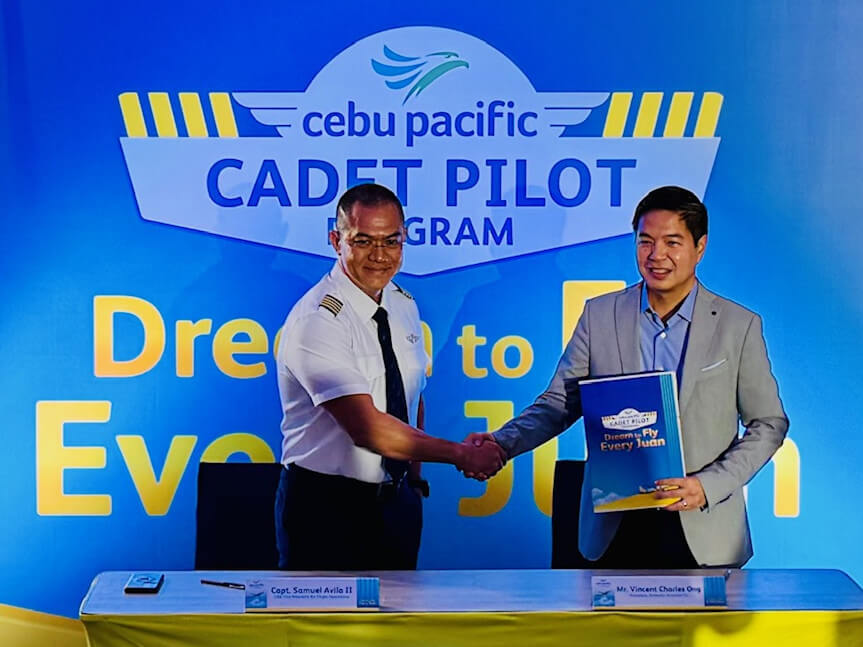

Ladies and gentlemen, good morning. Thank you for taking the time to join us in Cebu today for this historic moment in Philippine aviation.
Today, we celebrate the launch of the Cadet Pilot Program, a groundbreaking partnership between Cebu Pacific, the country's largest airline, and Airworks Aviation Academy, the premier flight training school in the Philippines.
This occasion is a homecoming of sorts, as Cebu Pacific, founded by a Cebuano family, returns to its roots.
Today marks an unprecedented milestone. For the first time, an airline cadet pilot program has been awarded to a company in the Philippines. Typically, airline-backed cadet programs in the Asia-Pacific region are dominated by Australia and New Zealand. Now, we proudly add Mactan/Cebu, Philippines, to the list of countries offering an airline-backed cadet pilot program.
Reaching this point was no easy task. The Asia-Pacific region is projected to experience the greatest growth in pilot demand over the next two decades. Despite this, no airline in the region had ever initiated a cadet pilot program in the Philippines. As a Filipino, I was determined to change this. The Philippines has everything needed: numerous airports, an abundance of English schools, and lower overall training costs compared to Australia and New Zealand. So ten years ago, I approached Cebu Pacific with this vision.
Though the journey took time and included the challenges of a global pandemic, I always believed Cebu Pacific was our ideal partner. Airworks has long been focused on airline flight training, renowned for its excellent standards. Over the past three decades, we have produced pilots from 31 different countries.
Cebu Pacific, on the other hand, is an airline I have always admired. As a Cebuano, I take pride in how Cebu Pacific has made Cebu more globally recognized. Wherever Cebu Pacific flies, it brings the name of Cebu to the world.More importantly, Cebu Pacific has continuously brought unquantifiable benefits to the Philippines and its people. For example, in the early 1990s, a roundtrip airfare to Manila cost around P5,000. Remarkably, despite inflation, wage increases, and a declining exchange rate, the ticket price remains around P5,000 today.
What this translated into is now everyone can fly. And when millions more of Filipinos got to fly, this didn’t only result into a flood of social media posts… more importantly, this resulted into millions of: dreams fulfilled, cultures connected, relationships saved or nurtured, businesses launched/expanded and indeed, as the pandemic showed, lives saved.
The vision of this cadet pilot program aligns with Cebu Pacific's mission of making air travel accessible to all. Many Filipinos aspire to become pilots but don't know how. This program aims to cast a wider net, providing aspiring pilots with thorough, efficient training under world-class airline standards. Most importantly, graduates of this program will have a job guarantee with Cebu Pacific, a truly unprecedented opportunity in Philippine aviation and education.
Cebu Pacific will benefit from a steady supply of highly proficient pilots, essential for their fleet expansion in the coming decade. For Airworks, this program brings educational advancements and growth, exposing us to the latest standards and methodologies sought by world-class airlines as We aim to be the flag-bearer for the Philippines in the global airline pilot training market.
Ultimately, it’s the Philippines who stands to gain the most. Tourism, a major economic driver, employed around 6 million Filipinos last year and is forecasted to grow to over 30 million jobs by 2028. The Economist projects our tourist arrivals to grow from 5.5 million to 43 million by 2030, making tourism the largest component of our GDP.
However, this growth depends on scaling up our aviation industry and infrastructure. And this is where our cadet pilot program plays an outsized & crucial role. The program in itself will generate hundreds of jobs. But ultimately, with planes being the mode of transportation for almost 100% of tourists, this will crucially help in generating millions of jobs for the country.
In closing, I would like to honor the late founder of Cebu Pacific, the visionary industrialist and philanthropist Mr. John Gokongwei Jr. Mr. John was a staunch advocate for education, believing that "education is the only way to save the country." His and his family's actions over the past decades, helping thousands of students, teachers, and schools, are a testament to this belief. In fact, all the schools I have gone to since Grade 1 all had Gokongwei buildings.
So as someone who benefited from their generosity, it is a truly a dream come true for me today to be able to partner with a Gokongwei company in the field of education, which Mr. John held dearly. This program will not only transform the lives of the cadets but also our country. I believe this is something Mr. John would be proud of.
Again, I extend my gratitude to Michael Szucs, Michael Lee, and Cebu Pacific mancom and team for this opportunity to contribute to the progress of the Philippines.To everyone here, I ask for your support as we embark on this program. The Philippines may have lagged behind our regional peers in many metrics, but today's launch shows that this will not be the case in aviation.Aviation will make our country soar again, but we cannot do this alone. At this stage, this is not just about Cebu Pacific and Airworks anymore; it is about the development of our country and the millions of Filipinos who will benefit from it.
Let’s do this for the Philippines! Thank you, and maayong buntag!